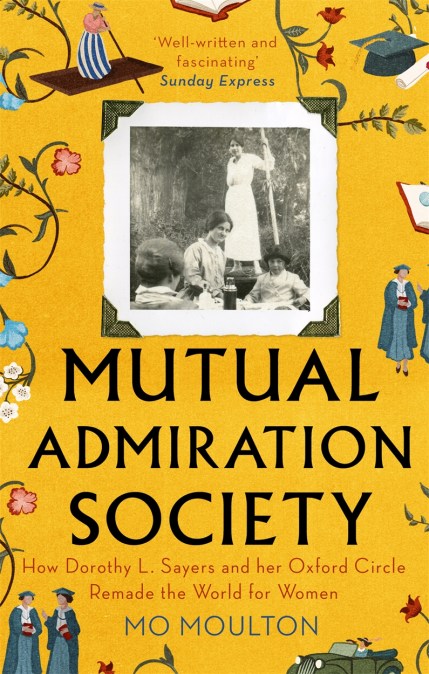Mutual Admiration Society
On sale
7th November 2019
Price: £10.99
Genre
‘An enjoyable anthem to friendship’ Hephzibah Anderson, Observer
‘Hugely enjoyable . . . Modern-day readers can thank the ambitious, complicated, funny, brave women of the Mutual Admiration Society’ Anna Carey, Sunday Business Post
‘A tribute to that precious but still unsung thing: the loving bond between female friends, based on intellectual exchange and deep affection’ Charlotte Higgins, Guardian
Winner of the Agatha Award for best nonfiction 2020
Dorothy L. Sayers is now famous for her Lord Peter Wimsey and Harriet Vane detective series, but she was equally well known during her life for an essay asking ‘Are Women Human?’ Women’s rights were expanding rapidly during Sayers’s lifetime; she and her friends were some of the first women to receive degrees from Oxford. Yet, as historian Mo Moulton reveals, it was clear from the many professional and personal obstacles they faced that society was not ready to concede that women were indeed fully human.
Dubbing themselves the Mutual Admiration Society, Sayers and her classmates remained lifelong friends and collaborators as they fought for a truly democratic culture that acknowledged their equal humanity. A celebration of feminism and female friendship, Mutual Admiration Society offers crucial insight into Dorothy L. Sayers and her world.
‘Hugely enjoyable . . . Modern-day readers can thank the ambitious, complicated, funny, brave women of the Mutual Admiration Society’ Anna Carey, Sunday Business Post
‘A tribute to that precious but still unsung thing: the loving bond between female friends, based on intellectual exchange and deep affection’ Charlotte Higgins, Guardian
Winner of the Agatha Award for best nonfiction 2020
Dorothy L. Sayers is now famous for her Lord Peter Wimsey and Harriet Vane detective series, but she was equally well known during her life for an essay asking ‘Are Women Human?’ Women’s rights were expanding rapidly during Sayers’s lifetime; she and her friends were some of the first women to receive degrees from Oxford. Yet, as historian Mo Moulton reveals, it was clear from the many professional and personal obstacles they faced that society was not ready to concede that women were indeed fully human.
Dubbing themselves the Mutual Admiration Society, Sayers and her classmates remained lifelong friends and collaborators as they fought for a truly democratic culture that acknowledged their equal humanity. A celebration of feminism and female friendship, Mutual Admiration Society offers crucial insight into Dorothy L. Sayers and her world.
Newsletter Signup
By clicking ‘Sign Up,’ I acknowledge that I have read and agree to Hachette Book Group’s Privacy Policy and Terms of Use
Reviews
It is a tribute to that precious but still unsung thing: the loving bond between female friends, based on intellectual exchange and deep affection
An enjoyable anthem to friendship
Deeply researched, beautifully written
Rich and careful . . . [Mutual Admiration Society] excavates the social and emotional context of the lives of four indomitable women with painstaking affection; it is as valuable as it is enjoyable
A blend of group biography and social history, Mutual Admiration Society tells a quintessentially English story
Mo Moulton shows [Dorothy L.] Sayers setting out in Gaudy Night, her most psychologically astute and least conventional novel, to present her own philosophy of women's intrinsic intellectual equality . . . Moulton's book sheds new light on Sayers's evolution as a writer, showing how some of her best work occurred in collaboration with her friend Muriel St. Clare Byrne
Hugely enjoyable . . . Modern-day readers can thank the ambitious, complicated, funny, brave women of the Mutual Admiration Society
Well-written and fascinating, it's equally successful as a biography and social history
This is an extraordinary book . . . Beautifully written, animated by a sense of quiet power and amazing ambition, this is essential reading for anyone interested in modern British history
Written with humour and insight, this is the fascinating group biography of Dorothy Sayers and five friends who formed a writing group at Somerville College Oxford in 1912 . . . This fine celebration of female friendship and early feminism reflects how far we have travelled since the post-Edwardian era
This lively, rigorous, and surprising history of Dorothy L. Sayers and her circle is a clear-eyed, optimistic look at a particularly critical stage in the evolution of feminism

